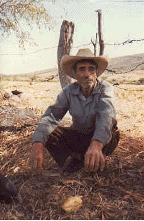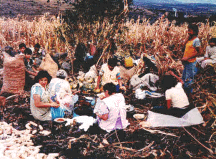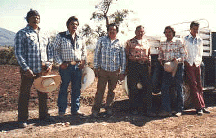As the countries of the South industrialized, the price of what family farmers produced, food, tended to decline relative to the price of the things they bought, industrial manufactures. Like governments in Europe earlier in history, Third World governments kept food prices down in order to keep industrial wages down and thereby promote industrialization. At the same time, they adopted policies which tended to make industrial manufactures more expensive than they'd be in a completely free market by offering protection to domestic industrial capitalists. Although these policies tended to be dismantled in the 1980s as the IMF and World Bank enforced "structural adjustment" policies on debtor nations, peasant farmers received no relief, since the same policies removed government subsidies on farm inputs and made credit more expensive.
Throughout the earlier period of "import substituting industrialization", family farmers were effectively forced to produce more, and work harder, just in order to be able to buy industrial products. "Modernization" meant a decline in rural self-sufficiency and the end of many of the "traditional" rural craft industries that had supplemented peasant incomes in many parts of the world. So in this sense Chayanov's notion of ‘self-exploitation’ is a misnomer. Peasants were actually being exploited by the rest of society, in the interests of an industrial capitalist class.
 This process definitely had a limit. Peasant incomes declined, and more and more peasants were forced to abandon farming through progressive impoverishment. Although Lenin was wrong about the rapid disappearance of peasant farms, rapid population growth meant that very large numbers of people were indeed proletarianized, and more and more peasants who continued some farming became "semi-proletarians". Even in Europe and America, family farming has been slowly collapsing, because farmers were forced to invest heavily in expensive new technologies and found themselves unable to pay their debts to the banks because the prices of what they produce weren't high enough. In the Third World, governments tried to keep peasant farming going, because peasants produced food so cheaply. They introduced new types of rural development schemes and in many cases land reforms. But these policies didn't really stopped the rot. Most Third World countries are now faced with the need to import vast amounts of food they could, theoretically, produce themselves, because the peasants who grew the food are no longer able to keep going simply by increasing their rates of "self-exploitation'’.
This process definitely had a limit. Peasant incomes declined, and more and more peasants were forced to abandon farming through progressive impoverishment. Although Lenin was wrong about the rapid disappearance of peasant farms, rapid population growth meant that very large numbers of people were indeed proletarianized, and more and more peasants who continued some farming became "semi-proletarians". Even in Europe and America, family farming has been slowly collapsing, because farmers were forced to invest heavily in expensive new technologies and found themselves unable to pay their debts to the banks because the prices of what they produce weren't high enough. In the Third World, governments tried to keep peasant farming going, because peasants produced food so cheaply. They introduced new types of rural development schemes and in many cases land reforms. But these policies didn't really stopped the rot. Most Third World countries are now faced with the need to import vast amounts of food they could, theoretically, produce themselves, because the peasants who grew the food are no longer able to keep going simply by increasing their rates of "self-exploitation'’.
Capitalist farming has in fact prospered and developed in most Third World countries by producing luxury foods for the urban middle classes and for export: here there's no competition from peasants, and Third World capitalists are highly competitive on the world market because of the very low wages they have to pay: one reason they pay low wages is that they employ people who are semi-proletarians: part of the costs of family subsistence are met from the family's peasant farming. So this type of capitalist farming has continued to expand as peasant agriculture has slipped deeper into crisis.
If wage levels are low enough, large-scale capitalist agriculture is viable, particularly where it can produce crops which are relatively highly priced on the world market. What developed in the Third World was a kind of integrated "division of labour" between peasant and capitalist agriculture, which Alain de Janvry termed "functional dualism". Capitalist prosperity was based not just on the cheap basic foodstuffs supplied by the peasant sector, but also on cheap labour supplied by peasant households. Labour was cheap because the peasant sector no longer consisted of self-sufficient family farmers producing their own subsistence. Unable to feed their whole family from what they could produce on the family farm. Peasants become a semi-proletarian labour reserve subsidising capitalist development. And their involvement in wage-work created all sorts of additional contradictions which reduced the viability of family farming because the family was no longer able to obtain the "free" family labour it needed to practice so-called "self-exploitation".
 For example, in the region of Mexico where I first worked, peasant farmers sowed land granted to them under Mexico's revolutionary land reform. The peasants sowed basic grains like maize and wheat, and by the 1970s, also sorghum, used as an ingredient in balanced feedstuffs for animals bred for meat by the capitalist sector. But many peasants rented their land to capitalist entrepreneurs who sowed tomatoes and other high value crops for the urban upper income market and for export. The peasant farmers and their landless sons couldn't make an adequate living sowing their land reform plots, so they worked for wages for the capitalist land renters. But the capitalists also employed women and young children. Sometimes the unmarried children would insist on working for the capitalist instead of helping their fathers. So the father didn't control an unpaid family labour force of the kind Chayanov's model assumed. Furthermore, in this part of Mexico, many young men preferred to take the risk of trying their luck as illegal migrants to the United States, where earnings were much higher than in Mexico. Unmarried girls sometimes left home to work in agribusiness packing plants in rural towns in the region, but some went to the USA as well, or to the electronics assembly plants set up by multinational companies in the northern border zone of Mexico. This situation undermined the viability of the family farm. Chayanov implicitly assumed that male heads of peasant households exercised an absolute patriarchal control over the rest of the family's members. So the patriarch only had to tell his wife, sons and daughters to do more work and the output of the farm increased without any cost apart from the physical strain involved. This doesn’t happen when sons and daughters refuse to work for their fathers, and work for wages for others or go to the USA instead. In these circumstances, the family farm can't increase its output without hiring non-family labour, and the Chayanovian model ceases to be applicable. When prices fall, peasants can often only increase output by increasing money costs. So they don't do it. If prices remain low, agricultural output begins to stagnate, and eventually starts falling, as it did by the end of the 1960s throughout Mexico.
For example, in the region of Mexico where I first worked, peasant farmers sowed land granted to them under Mexico's revolutionary land reform. The peasants sowed basic grains like maize and wheat, and by the 1970s, also sorghum, used as an ingredient in balanced feedstuffs for animals bred for meat by the capitalist sector. But many peasants rented their land to capitalist entrepreneurs who sowed tomatoes and other high value crops for the urban upper income market and for export. The peasant farmers and their landless sons couldn't make an adequate living sowing their land reform plots, so they worked for wages for the capitalist land renters. But the capitalists also employed women and young children. Sometimes the unmarried children would insist on working for the capitalist instead of helping their fathers. So the father didn't control an unpaid family labour force of the kind Chayanov's model assumed. Furthermore, in this part of Mexico, many young men preferred to take the risk of trying their luck as illegal migrants to the United States, where earnings were much higher than in Mexico. Unmarried girls sometimes left home to work in agribusiness packing plants in rural towns in the region, but some went to the USA as well, or to the electronics assembly plants set up by multinational companies in the northern border zone of Mexico. This situation undermined the viability of the family farm. Chayanov implicitly assumed that male heads of peasant households exercised an absolute patriarchal control over the rest of the family's members. So the patriarch only had to tell his wife, sons and daughters to do more work and the output of the farm increased without any cost apart from the physical strain involved. This doesn’t happen when sons and daughters refuse to work for their fathers, and work for wages for others or go to the USA instead. In these circumstances, the family farm can't increase its output without hiring non-family labour, and the Chayanovian model ceases to be applicable. When prices fall, peasants can often only increase output by increasing money costs. So they don't do it. If prices remain low, agricultural output begins to stagnate, and eventually starts falling, as it did by the end of the 1960s throughout Mexico.
Peasant production of food throughout the world is now declining. Capitalist agriculture prefers to grow higher-value crops, and so Third World countries have to import basic foodstuffs — very few countries in the Third World have maintained self-sufficiency in food. At the same time, prices for basic grains and wages remain low, and peasant households have become increasingly impoverished. This means that people have to continue to make do with low wages in their local economies, though more and more people have responded to this by migrating to Northern countries. Not everyone can migrate, however, and wages are falling for migrants too. So we get the increasingly prevalent scenario of prosperous Third World export agribusiness coexisting with the increasing malnutrition of ordinary rural people. This is, in part, the consequence of national policies during the import-substituting industrialization period, but it also reflects major shifts within the global agro-food economy once dominated by the United States and Western Europe.
 One of Chayanov's achievements was to show how family farmers could survive under market conditions where capitalist farmers go under, providing that the could use "free" family labour. This type of peasant "adaptation" may, however, become impossible if family labour ceases to be available — and it may be at the cost of the family getting poorer and poorer. Both these problems are central to the contemporary dilemmas of rural people.
One of Chayanov's achievements was to show how family farmers could survive under market conditions where capitalist farmers go under, providing that the could use "free" family labour. This type of peasant "adaptation" may, however, become impossible if family labour ceases to be available — and it may be at the cost of the family getting poorer and poorer. Both these problems are central to the contemporary dilemmas of rural people. This process definitely had a limit. Peasant incomes declined, and more and more peasants were forced to abandon farming through progressive impoverishment. Although Lenin was wrong about the rapid disappearance of peasant farms, rapid population growth meant that very large numbers of people were indeed proletarianized, and more and more peasants who continued some farming became "semi-proletarians". Even in Europe and America, family farming has been slowly collapsing, because farmers were forced to invest heavily in expensive new technologies and found themselves unable to pay their debts to the banks because the prices of what they produce weren't high enough. In the Third World, governments tried to keep peasant farming going, because peasants produced food so cheaply. They introduced new types of rural development schemes and in many cases land reforms. But these policies didn't really stopped the rot. Most Third World countries are now faced with the need to import vast amounts of food they could, theoretically, produce themselves, because the peasants who grew the food are no longer able to keep going simply by increasing their rates of "self-exploitation'’.
This process definitely had a limit. Peasant incomes declined, and more and more peasants were forced to abandon farming through progressive impoverishment. Although Lenin was wrong about the rapid disappearance of peasant farms, rapid population growth meant that very large numbers of people were indeed proletarianized, and more and more peasants who continued some farming became "semi-proletarians". Even in Europe and America, family farming has been slowly collapsing, because farmers were forced to invest heavily in expensive new technologies and found themselves unable to pay their debts to the banks because the prices of what they produce weren't high enough. In the Third World, governments tried to keep peasant farming going, because peasants produced food so cheaply. They introduced new types of rural development schemes and in many cases land reforms. But these policies didn't really stopped the rot. Most Third World countries are now faced with the need to import vast amounts of food they could, theoretically, produce themselves, because the peasants who grew the food are no longer able to keep going simply by increasing their rates of "self-exploitation'’. For example, in the region of Mexico where I first worked, peasant farmers sowed land granted to them under
For example, in the region of Mexico where I first worked, peasant farmers sowed land granted to them under